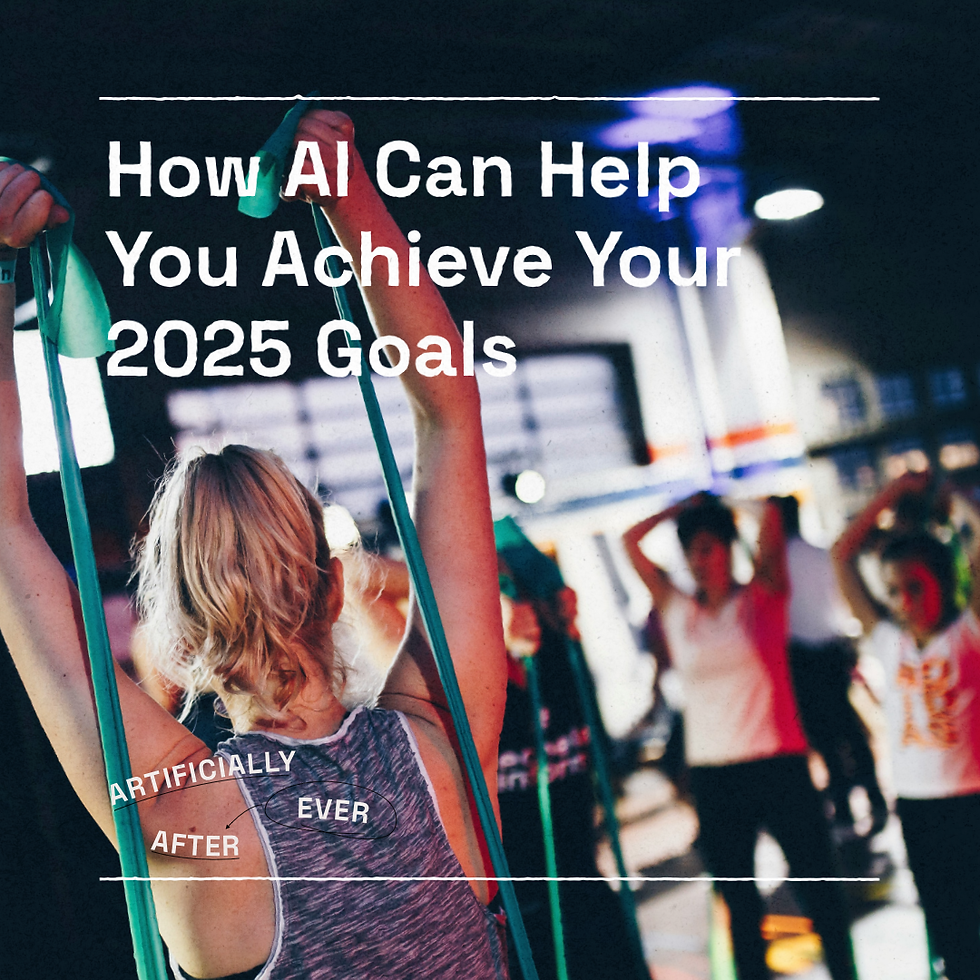How AI Can Help You Achieve Your 2025 Goals
- Kieren Sharma

- Jan 13, 2025
- 4 min read
Updated: Feb 28, 2025
Happy New Year everyone! In this episode of Artificially Ever After, we delve into how AI can be a powerful tool in achieving your 2025 goals. We're not just talking about lofty resolutions that fade by the end of January, but about using AI to make real, lasting change.

New Year's Resolutions: A Look at the Numbers
We started by looking at a recent survey from the Pew Research Center that explored who makes resolutions and how successful they are at sticking with them.
Three-in-ten Americans made at least one resolution for 2024, with half of that group making more than one.
New Year's resolutions are more popular among younger people aged 18 to 29.
Over half of those who didn't make resolutions said they simply don't like them.
After one month, only half of the people surveyed had kept all their resolutions, and 13% had kept none. This highlights the challenges many face in maintaining their goals.
Why Do We Fail at Keeping Resolutions?
Two major reasons were identified for why people fail to keep their resolutions: poor goal-setting and a lack of motivation.
Goal Setting: Often, goals are not specific, measurable, achievable, realistic, or time-oriented (SMART). The SMART framework was originally designed for professional settings. Overly outcome-focused goals can also lead to discouragement.
Motivation: Many people set goals based on what they think they should do, rather than what they want to do. Lack of accountability, poor tracking, and insufficient resources also contribute to a lack of motivation.
How AI Can Help
AI offers some unique solutions to help you achieve your goals.
Specificity: AI is now very good at breaking down large goals into smaller, manageable tasks. These systems can help you plan how to achieve your goal and suggest steps you might not have considered.
Measurement: AI can track your progress over time, using data from various devices and apps to provide personalised feedback and adjust your goals as needed.
Realistic Targets: AI models are trained on vast amounts of data, including many examples of people achieving similar goals, which allows them to set realistic targets and timelines.
Motivation: AI tools can help you find your 'why', provide accountability, and track your progress, which can all boost motivation. AI can also act as a “sounding board" to help you introspect and solidify your goals.
AI Tools for Your Goals
We explored various AI-powered tools, categorised by common New Year’s resolutions.
Health, Exercise, and Diet:
Personal Training: Apps and chatbots, such as ChatGPT, can create training plans. Strava and Whoop use AI to provide personalised workout analysis.
Smart Mirrors: MAGIC AI’s Fitness Smart Mirror provides real-time feedback on your exercise form.
Diet Tracking: MyFitnessPal uses machine learning and computer vision to track calories from photos of your food.
Personalised Nutrition: Zoe provides detailed nutritional responses based on your unique gut microbiome.
Quitting Addictions: Quitbot provides support for quitting smoking.
Money and Finances:
Relationships and Self-Help:
Wysa: With over 5 million users and counting, this mental health app combines an AI coach with human professionals to offer support, techniques for managing emotions and encouraging mental well-being.
Hobbies and Personal Interests:
Shortform: This app provides summaries of books and offers learning exercises to help retain the knowledge.
Duolingo: This language learning app uses AI to create interactive conversations.
Anki: This flashcard app uses spaced repetition to optimise learning.
Whisk: This app helps with generating shopping lists and meal plans.
BlossomI: Helps you identify house plant diseases and offer care advice.
Yoodli: This app is a speech coach, it gives feedback on how you speak and can be tailored to interviews, or other public speaking scenarios.
Work and Career:
Motion: This tool helps automatically schedule your calendar.
A Word of Caution
While AI offers many benefits, it's important to be aware of some potential drawbacks:
Missing Meaningful Experiences: Relying too heavily on AI-generated summaries or shortcuts can lead to missing out on the process and the learning opportunities it provides.
Over-reliance on Outcomes: Focusing solely on results can diminish the value of the journey and the skills you learn along the way.
Final Thoughts
AI is a tool, and like any tool, it should be used thoughtfully. The goal is to enhance our lives, not to replace the meaningful experiences that make us human. AI can help us track data and analyse it, act as a “rubber duck" to help clarify our problems, and provide useful data-driven nudges to keep us on track. As we move into 2025, let's embrace the potential of AI to help us grow, but without losing sight of the value of the process. We hope this episode has inspired you to set a goal, and perhaps achieve it with a little AI assistance.
If you enjoyed reading, don’t forget to subscribe to our newsletter for more, share it with a friend or family member, and let us know your thoughts—whether it’s feedback, future topics, or guest ideas, we’d love to hear from you!



Comments